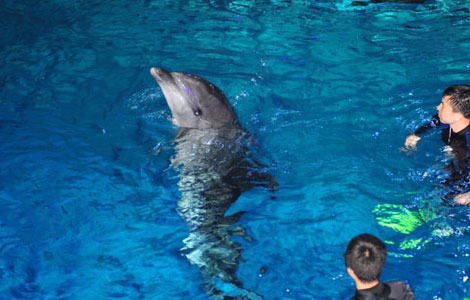
BEIJING - Even without the power to vote, experts say the Arctic Council's latest decision to grant observer status to China can guarantee the country's legitimate rights and activities in the region.
At the Eighth Ministerial Meeting of the Arctic Council on Wednesday, China and another five states were granted observer status in the organization.
Founded in 1996, the group now has eight member states in the Arctic region, including Russia, the United States, Canada, Sweden, Norway, Finland, Denmark and Iceland.
China first applied for observer status in the organization in 2006, and since 2007, it has been acting as an ad hoc observer.
Qu Xing, head of the China Institute of International Studies, said although it has no voting power, China can cast its influence through bilateral means and increase the transparency and equality of issues concerning the Arctic region.
Qu added that being granted observer status shows that China's activities in and opinions about the region have been recognized by all member states.
Former Chinese Ambassador to Norway Tang Guoqiang said that through its observer status, China will strengthen its cooperation with countries surrounding the Arctic in scientific research, the opening of new shipping routes and resource exploration.
China's activities in the Arctic region have long been focused on scientific research. As a country close to the region, China's climate, environment, agricultural production and sustainable development have been deeply influenced by the environment in Arctic region.
From July to September 2012, China's Arctic research team conducted the country's fifth comprehensive field studies of the region. It marked the first time for a Chinese research team to cross the Arctic Ocean and to travel the northeastern route of the Arctic area.
The country sent four research teams to the region in 1999, 2003, 2008 and 2010, respectively.
The Arctic region is becoming strategically important as its melting ice layer is making an Arctic route connecting Europe, East Asia and North America a possibility.
The potential Arctic route could shave 4,000 kilometers off the route from China to Iceland, compared to the traditional route that runs through the Mediterranean, Suez Canal, Indian Ocean, Malacca Strait and the South China Sea.
Tang said if the route opens up, China will join other Asian countries in taking advantage of the convenience, which would greatly reduce costs and increase freight volume.
"It will be favorable to all parties, on the condition that Arctic navigation rules are abided," added Tang.
In the meantime, abundant natural resources in the region are attracting more attention from all over the world. It is believed that the Arctic region is rich in oil, gas and other resources, leading some to dub it the "new Middle East."
Tang said he expects that China will be willing to import energy resources from the Arctic region in an effort to diversify its total energy imports.
"China will cooperate with other Arctic countries in energy based on equality, mutual benefit and win-win deals," added Tang.
China's economic cooperation with other states surrounding the Arctic is promising. In April, China signed a free trade agreement with Iceland, the first of its kind between China and a European country.
Experts also refuted some accusations that China hopes to grab and plunder natural resources in the Arctic region and establish a military presence there.
"It is misunderstanding and making mischief," said Qu. "China has no sovereignty claims in the region at all, nor intentions to initiate military activities."
Chinese Foreign Ministry spokesman Hong Lei said Wednesday China recognizes the Arctic countries' sovereignty, sovereign rights and jurisdiction in the Arctic area, as well as their leading role in the Arctic Council.
China respects the values, interests, culture and tradition of the Arctic aborigines and other inhabitants in the region, he added.







